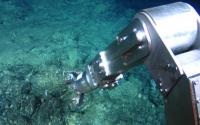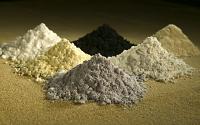Deep Seabed Mining

Quicktabs: Keywords

Mining's next frontier is proving tricky to navigate. Last week a British company became the latest firm to announce its intention to mine the seabed. However, it is still unclear how deep-sea mining will affect the oceans.
[ More ]
A new and controversial frontier in mining is opening up as a British firm joins a growing rush to exploit minerals in the depths of the oceans.
[ More ]
David Cameron has pledged to put Britain at the forefront of a new international seabed mining industry, which he claimed could be worth £40bn to the UK economy over the next 30 years. But the prime minister has chosen an American defence company – Lockheed Martin – to spearhead the drive to collect from the depths of the ocean the copper, nickel and rare earth minerals used in mobile phones and solar panels.
[ More ]
India has joined the race to explore and develop deep-sea mining for rare earth elements — further complicating the geopolitics surrounding untapped sources of valuable minerals beneath the oceans.
[ More ]
The author argues that if the U.S. wants to increase its access to Rare Earth Elements make domestic mining a more attractive investment then the Senate should ratify the Law of the Sea Treaty.
[ More ]
New marine research finds are fueling a gold rush as nations, companies and entrepreneurs race to stake claims to the sulfide-rich areas, which dot the volcanic springs of the frigid seabed. The prospectors — motivated by dwindling resources on land as well as record prices for gold and other metals — are busy hauling up samples and assessing deposits valued at trillions of dollars.
[ More ]
The author challenges the recent discovery of Rare Earth Elements in the seabed by noting that there are still a number of technical, financial, and political challenges that have to be overcome before mining these deposits are economically viable.
[ More ]
Japanese researchers say they have discovered vast deposits of rare earth minerals, used in many hi-tech appliances, in the seabed. The geologists estimate that there are about a 100bn tons of the rare elements in the mud of the Pacific Ocean floor.
[ More ]
The world's insatiable demand for the rare-earth elements needed to make almost all technological gadgets could one day be partially met by sea-floor mining, hints an assessment of the Pacific Ocean's resources. But accessing the treasure trove of key elements on the ocean floor will be very expensive and potentially harmful to sea-floor ecology.
[ More ]
For decades, entrepreneurs have tried to strike it rich by gathering up the manganese nodules that carpet the global seabed but until now they have not been able to prove the economic viability of these ventures. The nodules turn out to contain so-called rare-earth minerals — elements that have wide commercial and military application but have hit a production roadblock.
[ More ]